Hamish McLachlan: Positivity and skill a winning combination for paralympian Ellie Cole
ELLIE Cole had a cancer behind her right knee and had her leg amputated. Soon she will compete in her third Paralympic Games, where I’m betting she’ll add more gold to her haul.
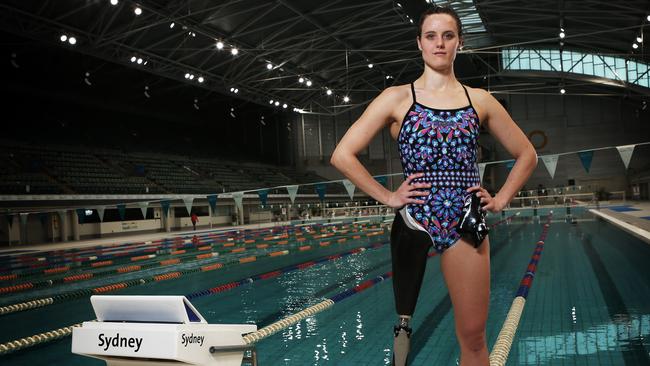
News
Don't miss out on the headlines from News . Followed categories will be added to My News.
ELLIE Cole had a cancer behind her right knee. She had her leg amputated. In a few weeks, she will compete in her third Paralympic Games. If I was a betting man, I’d be very happy to have a few shekels on her adding more gold to the four she already has. There are not too many people I have met who are more positive and fun to talk with.
As part of the Swisse Series we spoke about a life-changing diagnosis, bullying, swimming, pirates, losing her leg in the playground, an emotional comedown and a superb Paralympic career that is poised to continue in Rio.
HM: How old were you when you were diagnosed with sarcoma?
EC: I was two, still a baby, so I didn’t really understand what was going on.
HM: Your mum took you to the hospital thinking you had a spider bite on the back of your knee?
EC: Yes — I had a lump behind my right knee which she saw when she was changing me. She thought that it was a spider bite, so we went and had it checked out. They did a few biopsies, and it came back as cancer.
HM: Sarcoma is rare, it’s aggressive, and there’s no treatment. Diagnosis at two, amputation at three. Do you remember anything other than life as it is now?
EC: No. I rely a lot on my parents to explain to me what happened back then. It’s probably a good thing that I don’t remember it. I thought that growing up with one leg was just a normal thing. Then, when I hit school, it turned out that it wasn’t. Kids were curious and asking questions. I even had some kids teasing me in year 7, but I put an end to that pretty quickly.
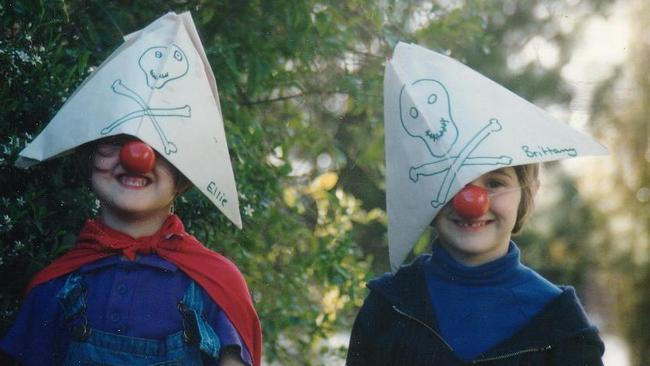
HM: How?
EC: There was a boy who called me a pirate. Heading into high school, I had to make it known that I wasn’t going to put up with it. I took off my prosthetic leg and threw it at him like a javelin. I will never forget all of the kids’ faces — they just dropped.
HM: Did it put an end to it?
EC: Yeah, it did. It spread around the school like wildfire, and no one ever teased me again!
HM: A note for reference: if anyone bullies you, throw your leg at them!
EC: It’s not something everyone can do … a perk of the amputation!
HM: Is it true that you once lost an artificial leg at school?
EC: It’s true. When you go to primary school, kids are curious about your leg. They want to know how it comes off, so one day I took it off and hopped around for a while. When
I came back it wasn’t there anymore. I don’t know who would steal a prosthetic leg!
HM: It’s not as if it’s one size fits all, is it?
EC: Exactly, but it’s funny because if you give a kid a prosthetic leg, they’ll still try and put it on. They’ll try and put it on at the end of their knee, and it’s always too long for them. They can’t stand up on it.
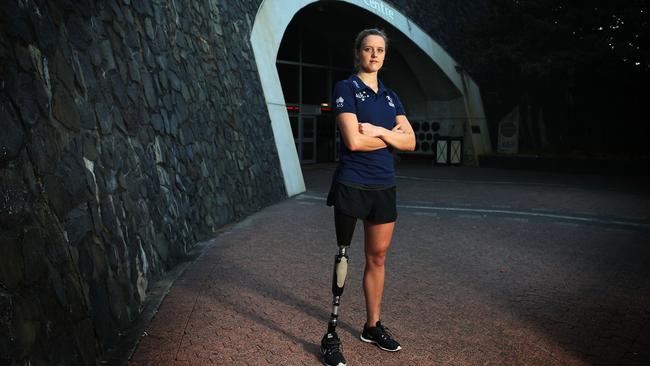
HM: What does a good prosthetic leg cost you these days?
EC: The prosthetic leg that I really want is waterproof and mud proof. That goes for $129,000.
HM: Some women like expensive shoes, but you’re in a new league! Did you once get out of an assignment at school because your leg fell off and snapped?
EC: It sounds like I’ve used my leg for every single excuse in the book, but, yes, that’s true. I remember walking around the playground, and it felt a little bit wobbly. Then, when I went back to class, my teacher asked me for my assignment. I said, ‘It’s in my bag. I’ll go and get it.’ I knew it wasn’t in my bag, because I hadn’t even done it. I was just going to use the classic excuse of ‘I left it at home’. I went out to my bag to find the assignment that wasn’t there, and while I was there, the bottom half of my leg fell off. You beauty! I hopped back into my classroom, holding the bottom half of my leg. The teacher looked at me and completely forgot about the assignment, as you would when someone has just hopped in with half a leg in their hand! She didn’t know what to do about it. She asked, ‘Do I send you to the nurse?’ and I’m like, ‘I don’t know. This has never happened to me.’ Eventually we got the school mechanic on the phone, and he came down and put it back together for me. I was never asked about that assignment again, so it was great!
HM: One of the rare occasions you’re delighted your leg snaps in half!
EC: Yes. I’d be in a lot of trouble if it happened now.
HM: Your mum enrolled you in swimming as part of your rehab. Do you remember getting in the water for the first time?
EC: No, I don’t. I’ve seen videos of me swimming in the earlier stages, mostly in circles to begin with … funny that! I eventually learnt to swim in a straight line!
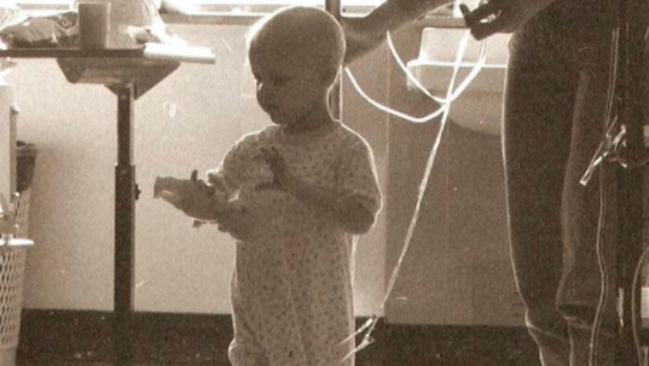
HM: Then you became quick enough to be thought of as a swimmer who would go well in Paralympic events. What was your first competition?
EC: I will never forget my first competition. It was actually across the road from here, at the Melbourne Sports and Aquatic Center. I remember sitting in the car on the way over, and I was telling Mum that I was going to beat everybody there. My whole family came to watch. I got there and didn’t realise that there were other Paralympians competing, who had obviously been to the Paralympic Games. When I dove in, my goggles fell off. I stopped, stood up and put them back on again. If I did that now, I’d have to swim a 500m butterfly as punishment. I don’t know what I came, but I didn’t win, and I was devastated.
HM: So you gave up music?
EC: I did. I hated losing, so I dropped my violin lessons and picked up an extra swimming lesson instead. I eventually swam myself onto the Australian swimming team.
HM: It worked. Five years later you went to the world championships, and came back a silver medallist.
EC: I did. I was the youngest swimming team member there and managed to win myself a silver medal, which I was really proud of.
HM: You found it hard to settle back into life post-Paralympics.
EC: I did. I was used to the excitement and adrenaline I felt preparing to compete, or competing for Australia. I was sad, and a little bored. It was a massive comedown. I still see athletes struggle with it, and I know exactly what it feels like. It got to a stage where I wasn’t turning up for training. I remember I would ride my bike to training in the morning, and then just sit around the corner so Mum thought I was at training, but I wasn’t.
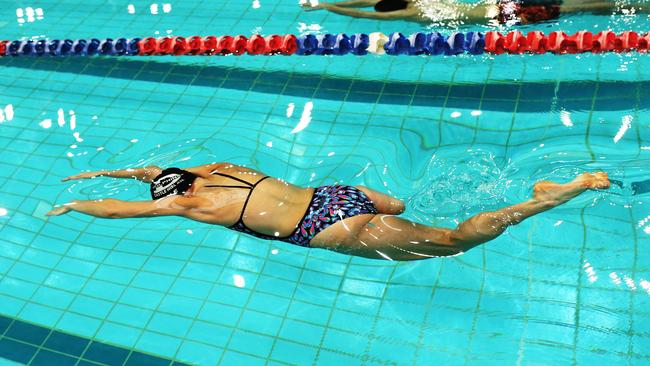
HM: What would you do?
EC: I’d sit with my friends and just fall asleep. I looked like a homeless kid. I think that if you’ve done something for so long, and then find yourself in a situation that you can’t deal with mentally, it can be hard. I think that’s what happened to me. I was just so young, and I didn’t know how to deal with my emotions at that age.
HM: You found your desire again, went to London and competed in eight events. An extraordinary number!
EC: Yes, never again.
HM: Six medals — four gold.
EC: I was training for the backstroke before London. I really wanted to win that one, and I wasn’t sure if that was going to happen, but to come home with four gold medals was beyond everybody’s expectations.
HM: You beat your idol, the legendary Natalie du Toit, twice.
EC: I beat her twice, and I actually felt terrible about it because London was her last competition, and I’d looked up to her for so long. I really wanted her to do well, but at the same time I really wanted to win. It was a strange feeling when I touched the wall and won for the first time. I was so excited and so relieved for myself, but I remember instantly looking over at Natalie and just feeling absolutely terrible and guilty about what I’d done.
HM: Ellie, you like quotes. The one I like the most is that you prefer to have a sore neck rather than a bad back. What’s the quote?
EC: It’s better to get a sore neck from aiming too high rather than a bad back from aiming too low.
HM: It resonates?
EC: Yes, one of them. Growing up with a disability meant I had a lot of people telling me I couldn’t always achieve what I set out to. I’ve always aimed pretty high when it’s come to functioning like a normal person does, and that’s why my disability hasn’t gotten the better of me. I’ve always set my goals high in life, as well as in my swimming.
HM: Another favourite of yours is from a young kid called Albert Einstein.
EC: He seemed clever didn’t he — I wish he was still walking the planet, I’d love to have a chat with him. “Insanity is doing the same thing over and over again and expecting different results.” I’ve found that to be really important with my sport, to make sure I’m always adding variety to allow me to develop and keep moving with forward momentum.
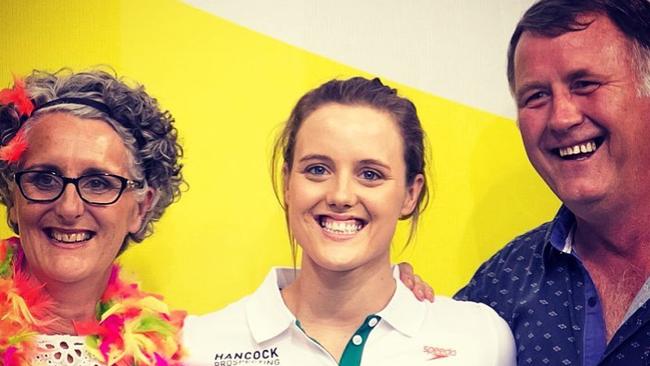
HM: OAM (Medal of the Order of Australia), what cool initials to have at the end of your name. Were you surprised?
EC: I knew that when you win a gold medal you get an OAM, and that’s what I really wanted, an OAM. It looks good on the resume. I might have some business cards made so they can sit on there too!
HM: In Rio, how many events will you compete in?
EC: Ideally, six. I would love to do the two relays because being part of a relay team is the best thing about being part of the swim team. Everyone on the swim team wants to be part of the relay.
HM: So six golds is possible.
EC: I would be happy with one gold, but I would be ecstatic with six. The Paralympic Games is tough. Of course I want to win all of my events, but I’m not going to be absolutely devastated if I don’t, because I know what the level of competition is like.
HM: You said Rio gold isn’t the sole purpose of going. You want to be the first person to break a minute in the 100m free. Is it possible?
EC: I’m not too sure. I do like to set my goals high, and I think once you win a gold medal that’s one of the highest levels you can get to. You need to set high goals to keep moving forward. It’s a big goal!
HM: You’re 1.02.65 now.
EC: I have to take more than 2½ seconds off, which I’ve been told is a crazy thought. When you go to a Paralympic Games, people can pull anything out of anywhere, and I hope to be that person!
HM: I hope you do just that and bring more gold medals home. Good luck.
EC: So do I — thanks, Hame.


